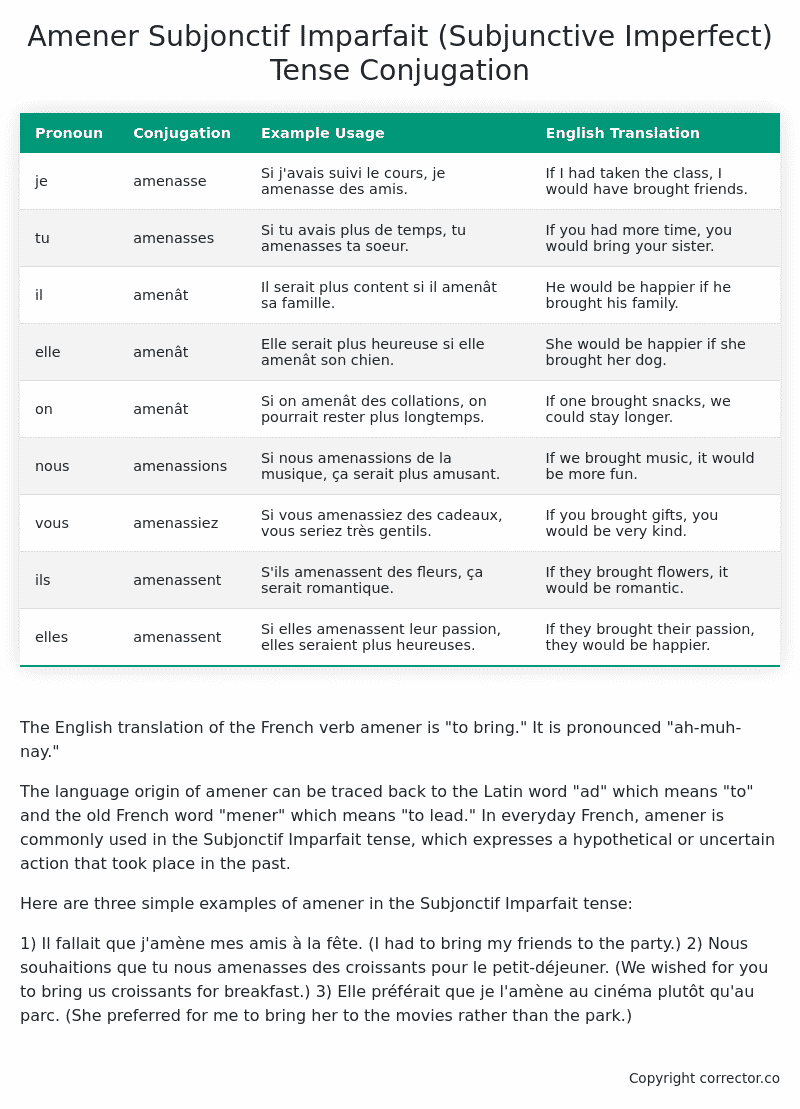Subjonctif Imparfait (Subjunctive Imperfect) Tense Conjugation of the French Verb amener
Introduction to the verb amener
The English translation of the French verb amener is “to bring.” It is pronounced “ah-muh-nay.”
The language origin of amener can be traced back to the Latin word “ad” which means “to” and the old French word “mener” which means “to lead.” In everyday French, amener is commonly used in the Subjonctif Imparfait tense, which expresses a hypothetical or uncertain action that took place in the past.
Here are three simple examples of amener in the Subjonctif Imparfait tense:
1) Il fallait que j’amène mes amis à la fête. (I had to bring my friends to the party.)
2) Nous souhaitions que tu nous amenasses des croissants pour le petit-déjeuner. (We wished for you to bring us croissants for breakfast.)
3) Elle préférait que je l’amène au cinéma plutôt qu’au parc. (She preferred for me to bring her to the movies rather than the park.)
Table of the Subjonctif Imparfait (Subjunctive Imperfect) Tense Conjugation of amener
| Pronoun | Conjugation | Example Usage | English Translation |
|---|---|---|---|
| je | amenasse | Si j’avais suivi le cours, je amenasse des amis. | If I had taken the class, I would have brought friends. |
| tu | amenasses | Si tu avais plus de temps, tu amenasses ta soeur. | If you had more time, you would bring your sister. |
| il | amenât | Il serait plus content si il amenât sa famille. | He would be happier if he brought his family. |
| elle | amenât | Elle serait plus heureuse si elle amenât son chien. | She would be happier if she brought her dog. |
| on | amenât | Si on amenât des collations, on pourrait rester plus longtemps. | If one brought snacks, we could stay longer. |
| nous | amenassions | Si nous amenassions de la musique, ça serait plus amusant. | If we brought music, it would be more fun. |
| vous | amenassiez | Si vous amenassiez des cadeaux, vous seriez très gentils. | If you brought gifts, you would be very kind. |
| ils | amenassent | S’ils amenassent des fleurs, ça serait romantique. | If they brought flowers, it would be romantic. |
| elles | amenassent | Si elles amenassent leur passion, elles seraient plus heureuses. | If they brought their passion, they would be happier. |
Other Conjugations for Amener.
Le Present (Present Tense) Conjugation of the French Verb amener
Imparfait (Imperfect) Tense Conjugation of the French Verb amener
Passé Simple (Simple Past) Tense Conjugation of the French Verb amener
Passé Composé (Present Perfect) Tense Conjugation of the French Verb amener
Futur Simple (Simple Future) Tense Conjugation of the French Verb amener
Futur Proche (Near Future) Tense Conjugation of the French Verb amener
Plus-que-parfait (Pluperfect) Tense Conjugation of the French Verb amener
Passé Antérieur (Past Anterior) Tense Conjugation of the French Verb amener
Futur Antérieur (Future Anterior) Tense Conjugation of the French Verb amener
Subjonctif Présent (Subjunctive Present) Tense Conjugation of the French Verb amener
Subjonctif Passé (Subjunctive Past) Tense Conjugation of the French Verb amener
Subjonctif Imparfait (Subjunctive Imperfect) Tense Conjugation of the French Verb amener (this article)
Subjonctif Plus-que-parfait (Subjunctive Pluperfect) Tense Conjugation of the French Verb amener
Conditionnel Présent (Conditional Present) Tense Conjugation of the French Verb amener
Conditionnel Passé (Conditional Past) Tense Conjugation of the French Verb amener
L’impératif Présent (Imperative Present) Tense Conjugation of the French Verb amener
L’infinitif Présent (Infinitive Present) Tense Conjugation of the French Verb amener
Struggling with French verbs or the language in general? Why not use our free French Grammar Checker – no registration required!
Get a FREE Download Study Sheet of this Conjugation 🔥
Simply right click the image below, click “save image” and get your free reference for the amener Subjonctif Imparfait tense conjugation!

Amener – About the French Subjonctif Imparfait (Subjunctive Imperfect) Tense
Formation
Common Everyday Usage Patterns
Interactions with Other Tenses
Subjonctif Présent
Indicatif Passé Composé
Conditional
Conditional Perfect
Summary
I hope you enjoyed this article on the verb amener. Still in a learning mood? Check out another TOTALLY random French verb conjugation!


